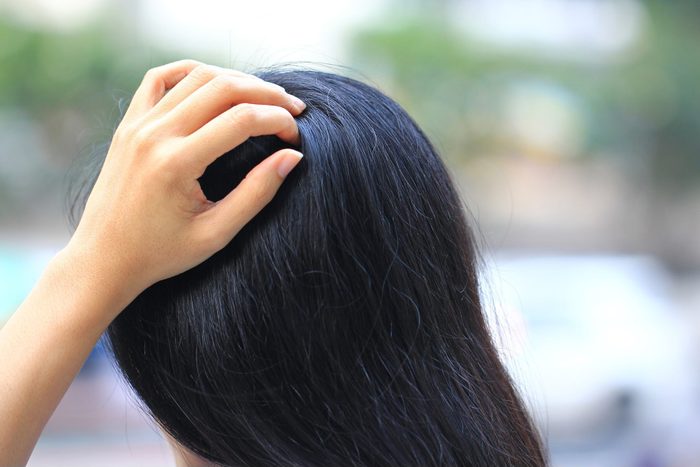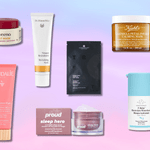Is It Scalp Psoriasis or Dandruff? Here’s How to Tell the Difference

Is your dry, flaky scalp caused by dandruff or scalp psoriasis? Here are pictures that can help you tell the difference, as well as treatment options for each.
Your scalp itches, and it’s driving you to distraction, to say nothing of the flakes that seem to fall like snow whenever you give in to the urge to scratch. What gives? There are many reasons that your scalp may itch, including dandruff and scalp psoriasis.
“Knowing what is causing the itching and flaking absolutely matters when it comes to effectively treating your symptoms,” says Adam Friedman, MD, professor and chair of dermatology at George Washington School of Medicine and Health Sciences in Washington, D.C.
Here’s everything you need to know when it comes to scalp psoriasis vs. dandruff, including symptoms, treatment options, and prevention tips.
(Related: 5 Sneaky Reasons You Suddenly Have Dandruff)
What is scalp psoriasis?
Scalp psoriasis occurs when your body’s immune system goes into overdrive and revs up the production of skin cells. Instead of shedding, these cells build up on your skin, forming raised, reddened plaques that itch and burn. These plaques may be covered with silvery scales that can flake off.
Psoriasis can strike any part of your body, including your scalp. More than half of people who live with psoriasis have plaques on their scalp, according to the National Psoriasis Foundation.
Scalp psoriasis symptoms
With scalp psoriasis, you may notice thick, crusted plaques that cover your scalp. It may extend beyond the hairline and onto the forehead, the back of the neck, and around your ears. Psoriasis flakes are thicker than dandruff. “The flakes are broader and more adherent to the scalp,” Dr. Friedman says. They also tend to be powdery with a silvery sheen. Scalp psoriasis runs the gamut from mild to severe and may cause hair loss.
“Scalp psoriasis can be more disabling than full-body psoriasis due to the visibility of your scalp, hair loss, and visible flaking that may occur,” Dr. Friedman says. With those symptoms, it can take a toll on your self-confidence and mental health.
(Related: 10 Things Dermatologists Wish You Knew About Scalp Psoriasis)
Dandruff symptoms
By contrast, dandruff has many causes, including overly dry skin that flakes, irritated and oily skin, not shampooing frequently enough, and infection with a fungus that tends to feed off oil on the scalp (Malassezia). It may also occur if you develop contact, or allergic, dermatitis from hair care products.
Dandruff may cause your scalp to itch, according to Dr. Friedman. “It affects areas with lots of oil glands, and the flaking is very fine,” he says. These flakes are made up of dead skin and often look yellowish and greasy. Keep in mind that if your head is very itchy and you don’t have obvious flakes that could be scalp psoriasis or dandruff, you could be dealing with another problem, such as head lice. Sometimes the lice nits or eggs can be mistaken for dandruff, but unlike dandruff, the white specks are attached to the hair shaft and can’t easily be brushed away.
Is it scalp psoriasis or dandruff?
You’ve spotted flaking. You’re definitely itchy. And you’re ready to know what you’re dealing with. But how can you tell if it’s scalp psoriasis vs. dandruff?
You may not be able to determine this on your own. To be fair, even the pros have a hard time telling the difference, Dr. Friedman says. Your dermatologist may examine the rest of your body to see if there is evidence of psoriasis anywhere else to make the call, he explains. “I will also look at fingernails to see if there is any pitting or separation of the plate from the nail bed,” he says. Nail psoriasis symptoms include white, brown, or yellow nails and crumbling.
(Related: How to Patch Test Skin Products to See If You’re Allergic)
How to treat scalp psoriasis
Scalp psoriasis is one scalp condition you should never ignore. Compared to people with psoriasis who don’t have scalp symptoms, people who have scalp psoriasis tend to be at higher risk of psoriatic arthritis, which is marked by joint pain and inflammation. So if you think you have scalp psoriasis, it’s a good idea to see a healthcare provider—psoriasis can affect many parts of the body.
“This is one of the reasons that it is so important to recognize scalp psoriasis and treat it aggressively,” says Dr. Friedman.
You can treat scalp psoriasis with some of the same shampoo ingredients used for dandruff.
Prescription and OTC shampoos
There is a host of prescription and over-the-counter (OTC) shampoos to treat scalp psoriasis. Using a tar, zinc, or salicylic acid-based shampoo can help slow skin growth and reduce inflammation, itching, and scaling, Dr. Friedman says.
Topical steroids
Treating the scalp with a topical steroid is not always easy since your hair can get in the way. “Finding a vehicle, such as a solution or an ointment, that plays nicely on your scalp can be difficult,” Dr. Friedman says. “You want a topical for your scalp that is cosmetically appropriate and won’t cause more problems.” He suggests telling your doctor what you would prefer, whether that’s a mousse, an alcohol-based solution, or an ointment.
Light therapy
Light therapy, which uses ultraviolet B (UVB) light to slow skin cell growth, may also help treat scalp psoriasis. You’ll generally use this under the supervision of a doctor to ensure safety.
Systemic therapy
When other treatments don’t work, you may need to try systemic medications. “I may step it up and give systemic therapy because of how disabling the scalp psoriasis is and because it’s a sign that this patient is at higher risk for psoriatic arthritis and other comorbidities that travel with psoriasis,” Dr. Friedman says
Systemic drugs such as biologics block certain proteins involved in the inflammation process. Cosentyx, a biologic drug that blocks interleukin-17A inhibitor, is approved to treat scalp psoriasis. “The hope is that by treating the underlying inflammation, we will reduce the chances of psoriatic arthritis and other diseases that may occur with psoriasis, including heart disease and diabetes,” he says.
(Related: Does Dry Brushing Really Make Your Skin Healthier?)
How to treat dandruff
Treating dandruff typically involves using a special shampoo and/or scalp treatment.
Dandruff shampoos
Some dandruff shampoos are available over the counter, and they’re a good place to start. Use one for a few weeks to see if you notice an improvement. If an OTC shampoo doesn’t do the trick, see your dermatologist about stepping up your therapy with a prescription shampoo or a steroid lotion, Dr. Friedman says. There are a lot of dandruff shampoos to choose from. They mostly differ based on their active ingredients.
Pyrithione zinc shampoos
These contain the antibacterial and antifungal agent zinc pyrithione.
Tar-based shampoos
These dandruff shampoos contain coal tar, which slows skin cell growth and reduces inflammation, itching, and scaling.
Salicylic acid-based shampoos
These can help eliminate dead skin cells from your scalp.
Selenium sulfide shampoos
These shampoos contain antifungal agents.
Ketoconazole-based shampoos
These kill the dandruff-causing fungi that live on your scalp.
Natural products
There are also natural treatments for dandruff, which may help. These include tea tree and lemongrass oils. In a study published in 2015 in Complementary Medicine Research, researchers found that people who use a lemongrass oil hair tonic twice a day for a week saw an improvement in dandruff.
What’s more, their dandruff continued to improve as time went on.
(Related: Do Shampoo Bars Work?)
Lifestyle tips to avoid scalp psoriasis and dandruff
Preventing scalp psoriasis
Taking steps to minimize or prevent psoriasis flares can help keep scalp psoriasis at bay. This involves avoiding triggers, such as stress or illness, when and where you can. Don’t pick at the scales, cautions Gary Goldenberg, MD, an assistant clinical professor of dermatology at Icahn School of Medicine at Mount Sinai in New York City. “For every one flake you pick, a hundred will come back,” he says.
Some foods, such as white flour, white sugar, and dairy. are pro-inflammatory and may exacerbate scalp psoriasis, says Dr. Goldenberg. To lower your risk of scalp psoriasis flares, eat a healthy, anti-inflammatory diet that is rich in fruits, vegetables, and seeds.
Preventing dandruff
If your scalp is oily, shampooing every day may help prevent dandruff. Always shampoo gently and make sure you’re washing your hair properly.
There are other causes of dandruff, such as stress and diet. Finding a healthy way to cope with stress—like meditation, yoga, or even just taking a walk—makes most things better, including dandruff symptoms.
Full-fat dairy foods, including cheese and cream, may lead to dandruff in some people. But foods rich in zinc, such as oysters, red meat, poultry, legumes, nuts, and seafood, may help control oil production and limit dandruff.




